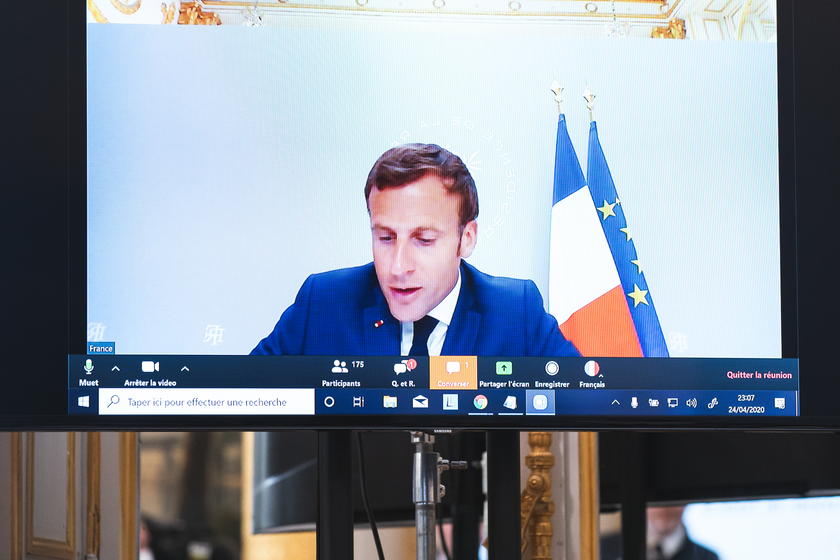The COVID-19 pandemic is an unprecedented global crisis which requires a large-scale international response to tackle its health, economic and social consequences all over the world.
Over the last few weeks, France and its partners have taken steps to produce an effective and prompt multilateral response. This involves:
- Increased health and economic coordination at the G7 and G20
- The initiative to support African healthcare systems and economies
- The United Nations Security Council initiative to enable a humanitarian truce in light of the pandemic.
- The initiative on diagnostics, therapeutics and vaccines in close collaboration with WHO, the European Union and all international stakeholders.
Extensive work is now underway all over the world to develop effective ways to tackle COVID-19. To move faster, the President of the French Republic has stressed that we must all work together and called for an unprecedented partnership between all stakeholders (States, regional and international organizations, public and private partners, academia, development banks, civil society).
The initiative
On 16 April, the President of the French Republic held a conference call with the heads of the main international organizations concerned with global health, which are active in the response to COVID-19 (WHO, Global Fund, Unitaid, Gavi, CEPI, Wellcome Trust, Bill & Melinda Gates Foundation, World Bank, Medicines Patent Pool, and Françoise Barré-Sinoussi, Chair of the Analysis, Research and Expert Committee) to step up international coordination with WHO and build a multilateral initiative. The participants agreed on the need for a coordinated, comprehensive initiative, focusing on both efficiency and equity.
These discussions led to the creation of a call for support, with the aim of accelerating development of and access to diagnostics, therapeutics and vaccines, including in the most disadvantaged countries.
This call is built around four pillars:
- Diagnostics
- Therapeutics
- Vaccines
- Support for healthcare systems in the most vulnerable countries.
This initiative includes research, production and distribution of these healthcare products. It is inclusive and open to other competent partners involved in the COVID-19 response (pharmaceutical industry, private sector in general, academia, national and regional development banks, civil society organizations).
To officially launch this initiative, a public videoconference was held on Friday, 24 April 2020 which included several Heads of State and Government and major global health stakeholders. The Secretary-General of the United Nations, António Guterres, WHO Director-General, Dr Tedros Adhanom Ghebreyesus, and the President of the French Republic, Emmanuel Macron, will spearhead the initiative alongside European and international partners.
Aims:
- Speed up the development and production of diagnostics, therapeutics and vaccines. This is particularly urgent as an increasing number of countries and territories are gradually lifting the restrictive measures taken to slow the spread of the virus.
- Ensure safe, equitable and universal access to diagnostics, therapeutics and vaccines. We must immediately conceive a comprehensive approach to ensure no-one is left behind and adopt a fair, transparent, equitable, effective and prompt international response.
- Consolidate healthcare systems to combat COVID-19 and continue to fight other diseases. The COVID-19 pandemic has had a major impact on the world’s most vulnerable people. It is essential to strengthen healthcare systems worldwide to help countries fight the pandemic, prevent these systems from becoming overwhelmed by the crisis, and not undermine progress made in combating AIDS, tuberculosis and malaria.
The work to meet these aims is based on three major principles:
- Coordination of stakeholders based around the call’s Commitments
- Support from the international community for this unprecedented coordination
- Deadline of 4 May 2020 set for financing.
France, a key player in global health
For many years, France has been taking strong action for global health. In the 2000s, it was behind the creation of major multilateral organizations which improved public healthcare access in developing countries: the fight against HIV/AIDS, tuberculosis and malaria (Global Fund), vaccinations (Gavi, the Vaccine Alliance) and innovation for all (Unitaid).
The President of the French Republic has strengthened France’s commitments to this inclusive, comprehensive and cooperative vision of health as regards multilateral organizations, including by organizing the Global Fund’s Replenishment Conference in Lyon in October 2019, where he increased France’s contribution by 20%.
In addition, on 9 April 2020, France launched the “COVID-19 – Health in Common” initiative to address the health crisis caused by the pandemic in the most vulnerable countries in Africa, the Indian Ocean, the Caribbean and the Middle East. With a budget of €1.2 billion, it will help to quickly support health systems, regional epidemiological monitoring networks and NGOs working on the ground.
Stakeholders working alongside WHO:
- UNITAID was created in 2006 following a French-Brazilian initiative to boost access to healthcare innovations and help scale them up.
- Gavi, a global alliance created in 2000, has for the past 20 years been playing a key role in facilitating access to and distribution of vaccines in developing countries.
- The Global Fund was created in 2002 with the aim of defeating the AIDS, tuberculosis and malaria epidemics. It is working to strengthen healthcare systems in the fight against COVID-19.
- CEPI (Coalition for Epidemic Preparedness Innovations) is a public-private partnership launched at the 2017 World Economic Forum aiming to fight epidemics and diseases for which there is no current vaccine.
- The Bill & Melinda Gates Foundation is a philanthropic organization created in 1994 working to finance development and global health issues.
- The Wellcome Trust is a foundation seeking to improve health by supporting science and research in order to respond to major healthcare challenges.
- The World Bank has set up emergency response projects to help tackle the health and economic consequences of the pandemic.
Relive the video conference of the launch of this initiative, in the presence of several state leaders and key players in global health:
Below, the President of the Republic's intervention during this conference:
On may 4, join our fundraiser in support of the research for COVID 19 vaccine and treatment!

